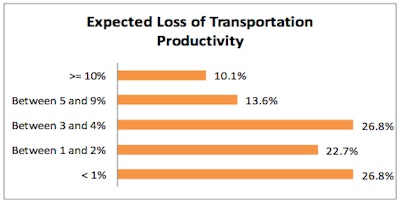
The study, done by the Global Supply Chain Institute at the University of Tennessee in Knoxville, recommends shipperss can, in lieu of raising rates, work with their carriers to extend lead time for some customers, increase customer delivery windows, improve shipment consolidation and increase the use of drop and hook freight.
The study says it’s “obvious that the loss of productivity cannot be absorbed by the carriers. Shippers will have to improve their operations in order to minimize the HOS Rule change impact.”
UT’s study included survey responses from 417 shippers, mostly in manufacturing, and 58 percent of them said passing on costs to their customers was the most viable strategy for coping with the costs of complying with the new rules.
About 47 percent of them said they anticipated a rate increase due to the new regulations. The researchers behind the study were more declarative: “It is our belief that the latter group is in denial about what’s going to happen. Rate increases will be coming,” the study reads. “It’s just a matter of how much.”
 Survey responses from the University of Tennessee study show that nearly a quarter of all fleets expect a productivity hit of at least 5 percent, and more than half expect it to be greater than 3 percent.
Survey responses from the University of Tennessee study show that nearly a quarter of all fleets expect a productivity hit of at least 5 percent, and more than half expect it to be greater than 3 percent.The same group plans to study the subject more in the middle of this year, it says, but in the December-released conclusions, the researchers said the new rules could “fatigue carrier relationships with customers” by causing shipments to take longer. It could also congest roadways due to a potential increase in trucks on the road designed to mitigate the productivity hit caused by the July 1 hours rule change.

In a separate survey, however, 70 percent of shippers said they would not consider shifting their freight to intermodal, although use of rail could reduce transit time of freight.
In other findings, the study concluded simply more of the same as far as hours research is concerned — restriction in productivity of drivers, particularly long-haul drivers, and higher costs for carriers and shippers.
The researchers also pointed to a compounding effect of trucking regulations (particularly, the Federal Motor Carrier Safety Administration’s Compliance, Safety, Accountability program) and an aging driver population as factors that could worsen the so-called driver shortage — again increasing costs for carriers and shippers.
Studies done by the American Transportation Research Institute and the Owner-Operator Independent Drivers Association since the July 1 rule change also point to similar findings — a decrease in driver productivity has resulted in lower miles and therefore lower pay for operators.
The study was conducted in October, and another study is planned for June.
Overturning the hours rule has been a hot topic for the American Trucking Associations and for members of Congress: ATA said in December overturning the rule change was a top priority for its 2014 agenda, and both the Senate and the House have introduced versions of a bill that would at least temporarily halt the hours rule and allow drivers to operate under pre-July 1 rules.
FMCSA Administrator Anne Ferro, however, said in a hearing before Congress in November that the agency “absolutely” would not overturn the hours of service rule change.









